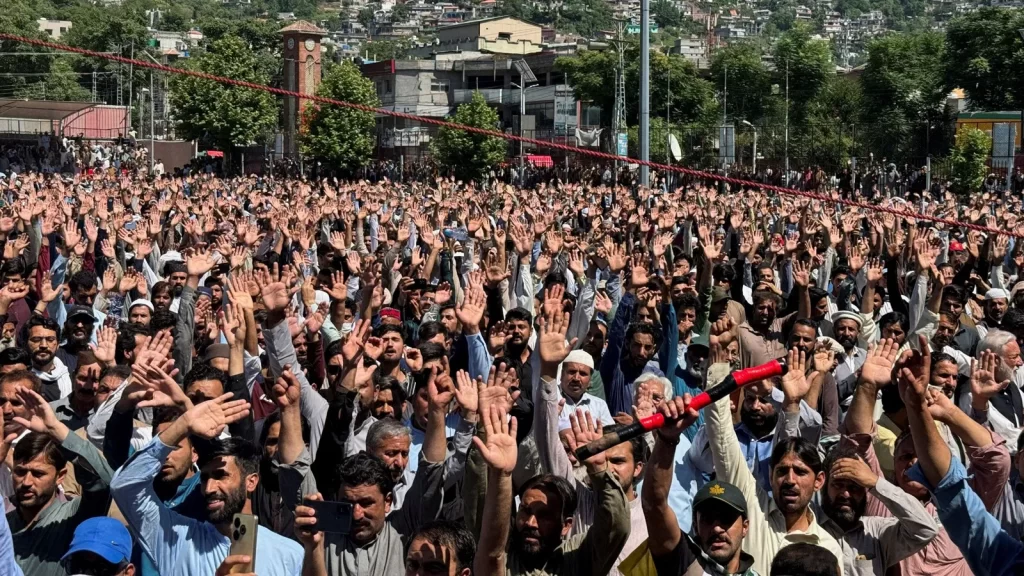In a groundbreaking turn of events, the geopolitical landscape of South Asia has witnessed a significant shift as the people of Pakistan-occupied Kashmir (PoK), Rawalakot, and Gilgit-Baltistan take to the streets to protest against Pakistan’s and China’s oppressive presence. What makes this movement extraordinary is the growing demand among these regions to be integrated into India—a development that marks a pivotal victory for India without engaging in a conventional war.
The Affidavit filed by Pakistan Govt. on POK Shook Pakistan
The momentum for this dramatic shift gained traction when Pakistan’s own government filed an affidavit in the High Court, categorizing PoK as a “foreign territory.” This legal admission inadvertently delegitimized Pakistan’s long-standing claims over the region and has added fuel to the already mounting discontent among the people of PoK and Gilgit-Baltistan. This official statement is being hailed in India as a tacit acknowledgment of the historical and constitutional position that PoK is an integral part of India.
The Groundswell of Protest
For decades, the people of PoK and Gilgit-Baltistan have endured political marginalization, economic exploitation, and the violation of human rights under Pakistan’s administration. These regions, which were promised autonomy under Pakistan’s control, have instead become hotbeds of unrest, owing to poor governance and an unrelenting military presence.
In recent weeks, this discontent has boiled over into widespread protests. Demonstrators have been rallying against Pakistan’s government and its growing reliance on China through projects like the China-Pakistan Economic Corridor (CPEC). The Karakoram Highway, a vital artery for Chinese investment and trade, has become a flashpoint as local communities block the route to signal their dissent. Their message is clear: they reject Pakistan’s exploitation and are equally wary of China’s neo-colonial intentions.
Demanding Annexation with India
The slogans raised by the protestors are a testament to the shifting loyalties in the region. Calls for annexation with India are growing louder and more frequent. The people’s demands stem from a combination of historical affinity, cultural ties, and India’s democratic ethos, which starkly contrasts with Pakistan’s authoritarian approach.
India, on its part, has consistently maintained that PoK is an inalienable part of its territory. Successive Indian governments have underlined this position on global platforms, asserting that Pakistan’s occupation is illegal and unsustainable. Now, the voices from PoK and Gilgit-Baltistan themselves are echoing this sentiment, lending a moral and political victory to India.
China’s Role in the Discontent
China’s increasing footprint in the region through CPEC has exacerbated local grievances. While the corridor promises development and investment, its implementation has come at a high cost for the local population. Land acquisition without adequate compensation, environmental degradation, and the influx of Chinese workers have alienated the local communities. Moreover, the Chinese military’s presence under the guise of securing CPEC projects has further inflamed tensions.
The people’s resistance to Chinese domination is evident in the blocking of the Karakoram Highway, a lifeline for CPEC. This act of defiance is not just a protest against China but also a rejection of Pakistan’s inability to safeguard its citizens’ rights and interests.
India’s Strategic Patience Pays Off
India’s victory in this scenario is a result of its strategic patience and diplomatic efforts. Unlike Pakistan, which has relied on proxy wars and terrorism, India has adopted a principled approach rooted in international law and moral authority. By consistently highlighting the plight of the people in PoK and Gilgit-Baltistan on global platforms, India has garnered international support for its stance.
Moreover, India’s recent strides in infrastructure development and socio-economic initiatives in Jammu and Kashmir have not gone unnoticed by the people across the Line of Control. The visible progress in the Indian-administered part of Kashmir serves as a stark contrast to the stagnation and repression in PoK and Gilgit-Baltistan, further strengthening the pro-India sentiment.
While the current developments signal a major victory for India, the road ahead requires careful navigation. Integrating PoK and Gilgit-Baltistan into India’s fold will involve addressing the region’s unique socio-political dynamics. India must be prepared to offer robust economic opportunities, ensure political representation, and safeguard the cultural identity of these regions.
On the diplomatic front, India will need to counter Pakistan’s inevitable attempts to regain control over the narrative. International forums like the United Nations will play a crucial role in consolidating India’s position and exposing Pakistan’s human rights violations in the region.
A Lesson in Soft Power
India’s triumph in PoK underscores the power of soft diplomacy and strategic patience. By refraining from military action and focusing on moral and political legitimacy, India has set an example of how long-term vision and adherence to principles can yield results.
The developments in PoK and Gilgit-Baltistan are not just a win for India but also a beacon of hope for oppressed populations worldwide. They demonstrate that the will of the people, when united and resolute, can overcome even the most entrenched systems of oppression.
So India has won the war for PoK without firing a single bullet, a victory that reflects the strength of its democratic ideals and principled diplomacy. As the people of PoK, Rawalakot, and Gilgit-Baltistan rise against decades of exploitation and demand integration with India, a new chapter in the region’s history is being written. This peaceful yet profound transformation reaffirms the enduring truth that justice and self-determination are the ultimate victors in the face of tyranny. For India, the task now is to embrace this historic moment with vision and responsibility, ensuring that the aspirations of the people of PoK and Gilgit-Baltistan are met with dignity and purpose.






